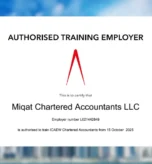Understanding Taxable Income Under UAE Corporate Tax: A Quick Guide

As the UAE embraces a corporate tax regime aligned with international standards, understanding how to determine taxable income has become essential for business leaders, finance managers, and CFOs. On 31 July 2024, the Federal Tax Authority (FTA) issued a detailed guide to help businesses accurately calculate their taxable income and corporate tax payable.
This blog breaks down the complexities of taxable income, adjustments, exemptions, and calculation methods, helping CFOs, business owners, and finance managers better understand how to stay compliant and make informed financial decisions.
What is UAE Corporate Tax?
UAE Corporate Tax is a federal tax levied on the income of corporations and other businesses. Introduced in 2023, the tax aims to reinforce the UAE’s global position as a hub for business by enhancing compliance, transparency, and alignment with international standards like the OECD’s BEPS framework.
UAE Corporate Tax Rate & Taxable Income Threshold
- 0% on taxable income up to AED 375,000
- 9% on income exceeding AED 375,000
This rate structure applies to resident and non-resident businesses with a permanent establishment in the UAE. Free Zone businesses may enjoy a 0% rate on qualifying income, subject to conditions.
What is Taxable Income?
Taxable income refers to a business’s net profit after applying adjustments required by the Corporate Tax Law. It starts with accounting income reported in the financial statements and is modified by adding non-deductible expenses and deducting exempt income or allowable deductions.
Starting Point: Accounting Income
Your taxable income calculation begins with accounting income, typically the net profit reported in your audited financial statements for the tax period.
- If your revenue is under AED 3 million, you may use cash basis accounting.
- If your revenue exceeds AED 3 million, you must apply the accrual basis using IFRS or IFRS for SMEs.
- Businesses with revenue over AED 50 million must also maintain audited financial statements.
Key Factors That Determine Taxable Income
1. Exempt Income
Certain types of income are exempt from corporate tax, including:
- Dividends received from UAE companies.
- Profits from foreign permanent establishments, provided certain conditions are met.
- Qualifying shareholdings under the participation exemption.
These amounts must be excluded from taxable income calculations.
2. Non-Deductible Expenditure
Only expenses that are wholly and exclusively incurred for business are deductible. The following are not deductible:
- Fines, penalties, or bribes.
- Expenses related to exempt income.
- Capital expenditures (which should be capitalized, not deducted).
- Non-arm’s length payments to related parties.
3. Expenditure Incurred for Mixed Purposes
If an expense is incurred for both business and personal purposes, only the business-related portion is deductible. Proper allocation and documentation are critical.
4. Pre-Incorporation and Pre-Trade Expenses
Some costs incurred before a company is incorporated or before it starts business operations can be deductible if they would have been allowed had they been incurred during the active business period.
5. Provisions and Reserves
Provisions for bad debts or warranties are not automatically deductible. You can deduct them only when:
- They are actually written off.
- Or when specific conditions under the tax law are met.
6. Unrealised Gains or Losses
The FTA allows you to elect to use the realization basis, meaning you will only recognize gains/losses when an asset is sold or transferred — not when its market value changes. This election must be made in the first tax period and is irrevocable.
Interest Deduction Limitations
General Rule:
Interest expense is deductible only up to 30% of adjusted EBITDA or AED 12 million, whichever is higher.
Specific Rule for Related Parties:
Interest paid to related parties may be disallowed if used for:
- Equity transactions (e.g. dividend distributions or share buybacks),
Unless the main purpose of the loan is a valid commercial reason, not tax avoidance.
Tax Loss Relief
If your business incurs a loss in one year, you can carry it forward and offset it against up to 75% of future taxable profits. Conditions include:
- Ownership continuity (at least 50%).
- Active business continuation.
Also, tax losses can be transferred within a qualifying group, subject to ownership and business activity tests.
Foreign Tax Credits
If you pay corporate tax in a foreign country on income that is also taxed in the UAE:
- You can claim a credit for that tax against your UAE corporate tax.
- However, excess credits cannot be carried forward or refunded — they are lost if unused.
How is Corporate Tax Calculated in the UAE?
Step-by-step approach:
- Start with Net Accounting Profit (as per financial statements)
- Adjust for Exempt Income (e.g. qualifying dividends)
- Add Non-Deductible Expenses (e.g. fines, personal expenses)
- Subtract Allowable Deductions (e.g. salaries, rent)
- Apply Corporate Tax Rate on income exceeding AED 375,000
Calculating Corporate Tax Payable in UAE
Here’s a simple example:
| Description | Amount (AED) |
|---|---|
| Accounting Income (Net Profit) | 600,000 |
| Less: Exempt Income | (50,000) |
| Less: Allowed Deductions | (100,000) |
| Add: Non-Deductible Expenses | 30,000 |
| Taxable Income | 480,000 |
| Taxable Income above AED 375,000 | 105,000 |
| Corporate Tax @ 9% | 9,450 |
Summary: Key Aspects to Determine Taxable Income
To accurately calculate taxable income in the UAE:
- Start with accounting income.
- Apply adjustments for exempt income, deductible/non-deductible expenses, and special provisions.
- Comply with interest deduction limits.
- Use tax loss relief and foreign tax credits when applicable.
Tips for CFOs and Business Owners
- Stay Proactive: Monitor FTA updates and document elections clearly
- Revisit Financial Structures: Evaluate impact of adjustments and exemptions
- Quarterly Provisioning: Avoid last-minute surprises by estimating provisions quarterly
- Ensure Documentation: Maintain backup for deductions, exemptions, and interest claims
- Work with Professionals: A tax advisor ensures accuracy and helps prevent penalties
Conclusion: Stay Compliant and Tax-Efficient with Expert Support
Navigating UAE Corporate Tax can be complex—but getting it right is critical for compliance, cash flow planning, and financial transparency.
At Miqat Chartered Accountants, we help you accurately calculate your taxable income, claim valid deductions, and structure your finances for maximum efficiency. Whether you’re preparing for your first corporate tax filing or need expert tax planning, we’re here to help.
📞 Call +971 54 583 0947
🌐 Visit www.miqatca.com
💬 WhatsApp us directly to speak with an advisor
Stay compliant. Save smarter. Choose Miqat.





